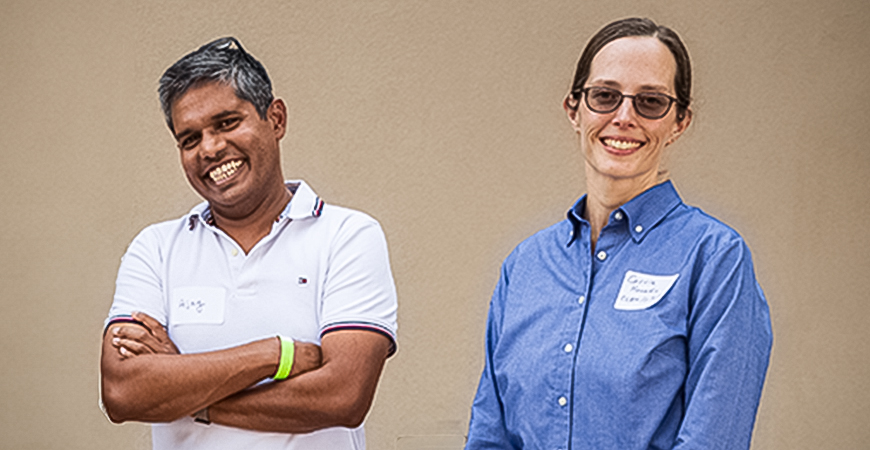
The National Science Foundation awarded a team, led by principal investigators Professor Ajay Gopinathan and Carrie Kouadio, funding to establish a summer Research Experiences for Undergraduates (REU) program at UC Merced.
This new program seeks to increase the diversity of the science, technology, engineering and mathematics (STEM) research community.
The Interdisciplinary Biological Engineering and Science Training (I-BEST) program is affiliated with the CREST Center for Cellular and Biomolecular Machines (CCBM) and will provide students hands-on experience they might not otherwise have in interdisciplinary research in biophysical sciences, biotechnology, biomaterials and bioengineering.
CCBM Executive Director Kouadio and CCBM co-founder and faculty co-Director Gopinathan will work with the Undergraduate Research Opportunities Center (UROC) and the STEM Center to provide mentorship, education, professional development and social activities for 10 students each year, who will live on campus for 10 weeks of the summer as they conduct research with faculty mentors.
CCBM already has one undergraduate academic-year fellowship program and one established summer research program focused on local students. I-BEST will offer spots to students from across California and the United States.
I-BEST REU will increase opportunities for underrepresented students as well as those with limited research opportunities and help prepare participants for graduate school and future careers, Kouadio said.
CCBM is an interdisciplinary center. It has been active since 2016 and integrates about 30 faculty members, 70 graduate students and 20 undergraduates, as well as multiple scientists and postdoctoral researchers, who all contribute to its research, education, training, outreach and efforts to broaden participation.
“Major advances nowadays in bio-related fields require contributions by people from multiple disciplines working together in a team,” Gopinathan said. “Students will be able to experience such cutting-edge research first-hand in the highly interdisciplinary and collaborative environment created and sustained by CCBM’s infrastructure, faculty and students. The knowledge generated through these projects should have a high scientific impact and lead to applications that benefit society.”
REU participants will work with graduate students and faculty on projects that cross the boundaries between chemistry, physics, materials science, molecular and cell biology and bioengineering. They will enhance their research skills, develop effective scientific communication skills — especially across disciplinary boundaries — develop their confidence in doing team science in interdisciplinary fields and help advance scientific understanding.
They also will get exposure to life on a UC campus, attend networking and professional development workshops, including career panels with industry experts, and take part in activities such as trips to Yosemite National Park, movie nights and tours of the Merced Vernal Pool and Grassland Reserve.
CCBM’s established summer research program has recruited diverse cohorts since it began in 2016 — 64% from underrepresented groups, 35% Hispanic and 57% women — and Gopinathan and Kouadio aim to replicate or better those results.
They and affiliated faculty plan to recruit at CSU campuses, as well as community colleges in the Central Valley, and at national events such as the Society for Advancement of Chicanos/Hispanics and Native Americans in Science conference and the Annual Biomedical Research Conference for Minoritized Scientists.
I-BEST is now the second active REU site at UC Merced, along with one in physics, and the sixth for the campus since its founding.
Gopinathan is a professor in the Department of Physics, where, since 2006, he has been leading a research group using theoretical and computational methods to understand biological transport and self-organization. He is also a member of the Health Sciences Research Institute, serves as a director of the National Institutes of Health-funded G-RISE graduate training program and is the chair of the national Division of Biological Physics of the American Physical Society.
For over seven years, Kouadio has served as executive director of the CCBM, working with faculty, project scientists, students, staff and partners to achieve the Center's research, education, outreach and participation-broadening goals. She oversees Center administration and K-12 and community outreach, including the Science for Humanity Series, the annual Open House and CCBM summer camps.
“We are truly pleased that our CREST Center is continuing to bring in new opportunities for research connected to our scientific focus areas,” Kouadio said. “By giving undergraduates from outside of UC Merced the chance to conduct interdisciplinary research on our campus for a summer and to participate in valuable professional development sessions, these students will be well-positioned to consider UC Merced for their graduate studies and to pursue their career goals.”






